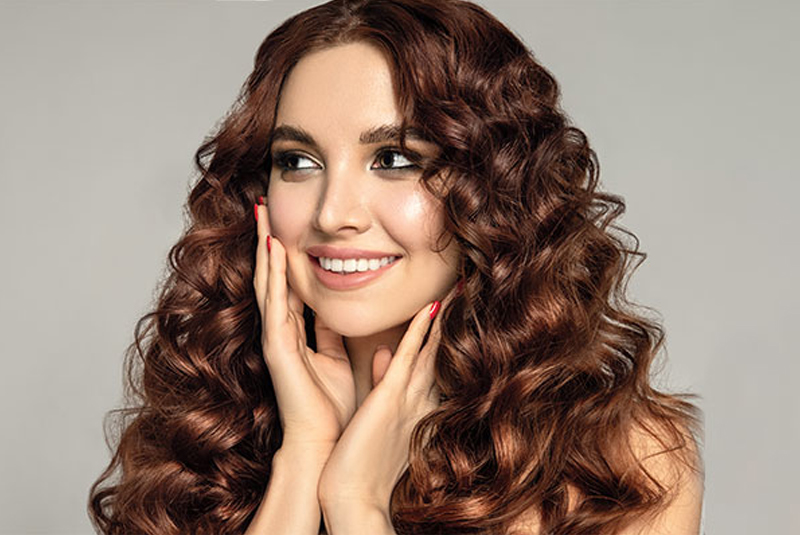Opening Hours : Saturday to Tuesday - 8am to 10pm
-
contact@parehealthcareprices.com -
Call Now
+91 730-572-3358
Caring for Curly Hair

Caring for Curly Hair
Curly hair, unlike straight hair, lacks moisture and dries out quickly, making it more difficult to maintain.
Your hair follicles determine the amount of curl in your hair. Curly haired people have follicles that are more oval or asymmetrical. Of course, your genetics have a role in this.
We lay down the tips and tactics you'll need to keep your natural curls healthy if you want to add extra bounce and sparkle to them.
How to take care of naturally curly hair?
When it comes to curly hair, you'll want to focus on items that aid give moisture to the hair and stay away from anything that may dry it out or weigh it down.
Choose the right shampoo and conditioner
Look for shampoo and conditioner that are created specifically for curly hair.
In general, seek for items that include the following features:
1. Coconut oil, jojoba oil, sunflower oil, and avocado oil are examples of natural or essential oils.
2. aloe vera
3. keratin
4. shea butter
5. aloe vera
6. hydrolyzed silk and animal proteins
7. panthenol and provitamins
8. plant extracts
While you may not want to wash your hair every day, when you do, choose a moderate shampoo with extra conditioning agents and milder cleansing agents.
If your hair is oily or filthy, a stronger clarifying shampoo should be used once or twice a week. To assist lock in moisture, always use a conditioner after shampooing.
Pre-shampoo treatment
If you have coarse or curly hair, a pre-shampoo treatment may be beneficial.
You don't have to condition only after cleansing, contrary to popular assumption. Conditioner can be used both before and after shampooing.
Hair that is coarse and curly loses moisture rapidly. In theory, using a conditioner before shampooing protects the hair strand by preventing the shampoo from stripping the hair of its natural oils.
Avoid over-shampooing
For persons with curly hair, shampooing every day isn't a good idea. Shampooing might deplete the hair's essential natural oils.
To find out what works best for you, you may need to experiment with a cleansing programme. Shampooing every other day or every three days is a good rule of thumb.
Choose the right brush or comb
When combed or brushed, curly hair is generally dry and brittle, and it can easily break. To avoid breakage, brush or comb curly hair in the shower.
To break up any knots, start with a wide-tooth comb. To make things easier and guarantee that the conditioner coats all of your strands, you can comb while the conditioner is still in your hair.
Invest in a high-quality brush with natural bristles rather than plastic when purchasing a hairbrush. A boar bristle brush can aid in the distribution of natural oils from the scalp to the hair's ends.
Another approach is to avoid brushing or combing your hair at all. Apply a leave-in conditioner and rake through damp hair with your fingertips if you have very springy curls.
Heat styling curly hair
Blow-drying curly hair can make it frizzy and damage it, so most stylists recommend letting it air dry.
If you wish to use a blow dryer or straighten your hair with a straightening iron every now and then, you should use a heat-protecting spray or treatment first. To seal the cuticle and make it more resistant to heat damage, look for a spray that contains silicone or keratin.
When blow-drying your hair, keep your hair dryer 6 inches or more from the surface of your hair, according to researchers.
To assist decrease the amount of direct heat that strikes your hair, install a diffuser attachment to your blow-dryer.
Avoid split ends
Split ends are difficult to totally avoid. Furthermore, the only way to fix them is to cut them off.
The easiest technique to avoid split ends is to treat your curly hair gently.
To avoid split ends, do the following:
1. Brush with a detangler to avoid tugging and yanking.
2. Avoid tying your hair up in tight ponytails or buns.
3. Make sure you use a comb with a wide tooth.
4. Heat tools should be avoided.
5. Every 2 to 3 months, have your hair cut by a skilled stylist.
